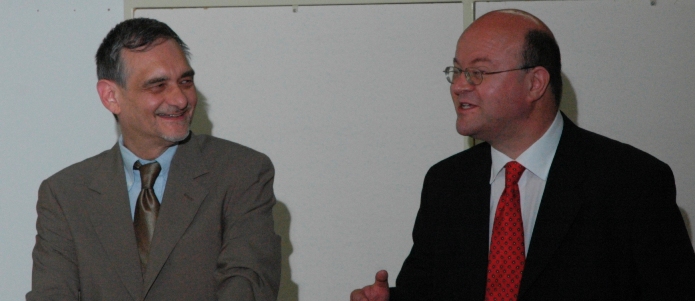Informed Talks on Wartime Axis Europe Policy Highlight IHR Meeting
News from the Institute for Historical Review
Two informed lectures on plans for the postwar era by leaders in Germany and other Axis nations during World War II, and their vision of a prosperous European community, highlighted the IHR meeting on July 31, 2010.
Adrian Davies, an English attorney and lecturer, and Mark Weber, historian and director of the IHR, presented views on how Europe might have developed if the Soviet Union had been vanquished in 1941 or 1942, and British leaders had made peace with Germany.
 Guest speaker Adrian Davies addresses the meeting Guest speaker Adrian Davies addresses the meeting |
 Mark Weber stresses a point during his talk Mark Weber stresses a point during his talk |
Davies began by expressing appreciation for the IHR, its work, and its director. He praised the quality of the IHR website and of the informative “IHR News and Comment” e-mail bulletins.
During the war, said Davies in his talk, the German leadership stressed stability above ideology, and generally did not try to impose its own social-political system on other nations. He cited Philippe Petain in France, Miklos Horthy in Hungary, Ion Antonescu in Romania, and Francisco Franco in Spain to make the point that although these leaders aligned their nations with Hitler’s Germany, their regimes were traditionalist and narrowly “patriotic,” rather than socially progressive or pan-European.
Another problem, said Davies, is that the national-patriotic character of the various European regimes fueled rivalries and antagonisms. For example, deep-rooted nationalistic passions over rival claims to the Transylvania region hampered relations between Romania and Hungary, and similar national antagonisms soured relations between France and Italy, between Slovakia and Hungary, and between Croatia and Italy.
It was only during the final months of the war, said Davies, that Berlin turned in desperation to more ideologically compatible figures, such as Jacques Doriot and Marcel Deat in France, Ferenc Szalasi in Hungary, and the Legionary movement leaders in Romania, to head governments that could be relied upon to continue the military struggle.
If the Axis alliance had won, Davies said, the postwar European order would have been more “traditionalist” and less pan-European than many imagine.
In his talk, Mark Weber cited wartime German policies, along with writings and speeches by German political and business leaders, including Hitler, as well as analysis by postwar scholars, to sketch the outlines of the Pax Europa that likely would have developed in the aftermath of the war.
Political, economic and business leaders in Germany, as well as in other European nations allied with Berlin, laid out plans and enacted policies in 1941-1944 that were meant to secure long-term prosperity and healthy economic, social and cultural development for the peoples of the entire continent.
These men, said Weber, envisioned a Europe that would be economically integrated, politically confederated, and secured with a pan-European military force. They laid plans for a cooperative European confederation or community of nations, with coordinated monetary, trade and labor policies. Some features of this visionary prospect were already put into place during the war years. Trade between the various European states, which grew tremendously 1941-1944, was organized through a “barter” or “clearing” system that eliminated dependency on gold, the US dollar, or the British pound.
 A lighter moment as Davies makes a point
A lighter moment as Davies makes a point
German newspapers, magazines and newsreels put great stress on the themes of continental unity and a common European destiny forged in war, and to building a peaceful and prosperous community of nations.
While the priority task was to win the war, German leaders remained mindful of the long-term objective of building a durable “new order” in Europe. They understood that it was in Germany’s interest — both short term and long term — to encourage production, commerce and prosperity not just in their own country, but across the continent.
An important factor that both strengthened and gave expression to the growing pan-European outlook was the Waffen SS, which grew from a small elite German corps in the 1930s to a vast multi-national force that, by late 1944, embraced military formations of many nationalities, including Ukrainians, Norwegians, Latvians, Frenchmen, Bosnian Muslims, Estonians, Flemish, and even Russians.
An Axis-dominated Pax Europa, Weber suggested, would have been prosperous, socially progressive, politically stable, and technologically advanced, with an extensive, continent-wide transportation and communications network, conscientious environmental policies, and a comprehensive healthcare system. At the same time, the continent would have remained ethnically and culturally European. Large scale immigration of non-Europeans would have been unthinkable.
The policies, plans, outlook and experiences of Germany and the other Axis nations in the 1941-1944 period merit a closer and more open-eyed look, said Weber. They are all the more relevant and instructive today, he said, given the dramatic global changes of recent decades — including the collapse of Soviet Communism and the deepening crisis of US-Western capitalism and liberal democracy.
Concluding this IHR meeting was a brief talk by a businessman who urged attendees to consider making a monthly recurring online donation to support the Institute’s work.